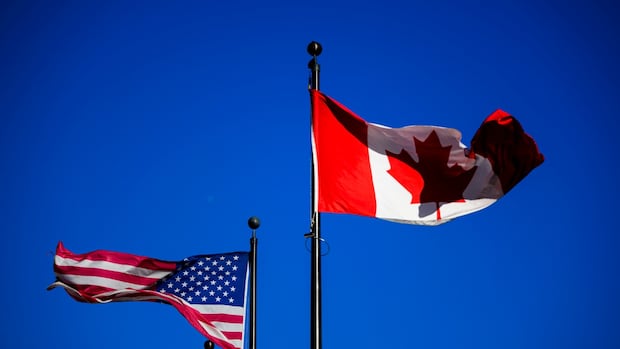OttawaBusiness owners in the nation’s capital are reacting with guarded optimism after Prime Minister Mark Carney announced he plans to drop most of Canada’s retaliatory tariffs on U.S. goods starting September.Some hope the gesture will help negotiators forge a better trade dealNathan Fung · CBC News · Posted: Aug 24, 2025 1:32 PM EDT | Last Updated: 2 hours agoPrime Minister Mark Carney said last week that his government would drop all tariffs on goods from the United States that are covered by the Canada-U.S.-Mexico Agreement by the beginning of September. (Justin Tang/The Canadian Press)Business owners in the nation’s capital are reacting with guarded optimism after Prime Minister Mark Carney announced he plans to drop most of Canada’s retaliatory tariffs on U.S. goods by the start of September.On Friday, Carney revealed that Canada will remove all tariffs on goods from the United States that are covered by the Canada-U.S.-Mexico Agreement (CUSMA) by Sept. 1, but will maintain its tariffs on steel, aluminum and autos.He also noted that 85 per cent of trade with the U.S. is still tariff-free.CBC News spoke with several business owners in Ottawa who called the move a good sign, saying they’re confident that Canada’s removal of retaliatory tariffs on the U.S. bodes well for better trade relations.”I think this is an act of good faith, as challenging as it could be for our economy,” said Jason Tasse, president of Lee Valley Tools in Ottawa.”But [it] could be instrumental in striking a better deal going forward for both countries.”A file photo of Lee Valley Tools president Jason Tasse from 2022. Tasse called the dropping of retaliatory tariffs ‘an act of good faith.’ (Sarah Bridge/CBC)While optimistic, Tasse notes that the constantly changing trade landscape means that he’s frequently revisiting the company’s pricing and profit margins — something that’s especially challenging, given his company’s 600-page catalog has been sent out.”From a business planning point of view, it is a constant challenge when you don’t know what your margin impacts will be based on these policy changes,” he said. Also optimistic is Kichesippi Beer Co. owner Paul Meek, who sources aluminum cans from the U.S.Meek sees the dropping of retaliatory tariffs as an “olive branch,” and has confidence in the government’s ability to negotiate a positive outcome.”As a small business person, I need to try and look at things positively,” he said.”So I’m definitely trying to look at this as what I hope will be more good news for the economy and more good news for small business.”Ottawa brewery owner Paul Meek, seen here in 2018, sources aluminum cans from the U.S. He said he trusts the Canadian government’s handling of the trade file. (David Richard/CBC News)’Deeply impacted’News that retaliatory tariffs are being dropped are also a relief for businesses that both do most of their business — and source many of their parts — south of the border.Ambico CEO Jack Shinder, whose Ottawa-based company which makes blast-proof and bullet-resistant doors, said they’ve been “deeply impacted by the tariff regimen” as most of their customers are in the U.S. Shinder said his company also relies on parts from the U.S., so it’s unrealistic for him to completely revamp his supply chains.”[They] have been built up over 40 years,” he said. “We can’t just change those supply chains overnight.”Shinder adds that Canada’s counter tariffs have not been effective in the ongoing trade war.”We thought the imposition of retaliatory tariffs would lighten the tariff load that we Canadian manufacturers would experience,” Shinder said. “I think that has had very little if no effect.”Ontario Premier Doug Ford also weighed in on the announcement.I spoke with Prime Minister Carney following his announcement to stress the need for an agreement with the United States that provides relief to our tariff-impacted sectors, including steel, auto, forestry and copper. If the federal government can’t achieve that, they need to hit…—@fordnationIn a social media post, he said he’d spoken with Carney on the matter and that an agreement with the United States needs to provide relief to sectors like steel, auto, and forestry that have been hit hard by tariffs.”If the federal government can’t achieve that, they need to hit back hard against U.S. tariffs and provide additional supports for the workers and businesses in these sectors,” Ford wrote.Ottawa MorningLocal businesses bracing for tariffsAmbico’s Jack Shinder and The Village Quire’s Molly Van der Schee talk about strategies to weather the trade war.ABOUT THE AUTHORNathan Fung is a reporter with CBC Ottawa, with a strong interest in covering municipal issues. He has previously worked as a reporter in Hamilton and Edmonton. You can reach him at nathan.fung@cbc.ca
Monday, 22 Dec 2025
Canada – The Illusion
Search
Have an existing account?
Sign In
© 2022 Foxiz News Network. Ruby Design Company. All Rights Reserved.
You May also Like
- More News:
- history
- Standing Bear Network
- John Gonzalez
- ᐊᔭᐦᑊ ayahp — It happened
- Creation
- Beneath the Water
- Olympic gold medal
- Jim Thorpe
- type O blood
- the bringer of life
- Raven
- Wás’agi
- NoiseCat
- 'Sugarcane'
- The rivers still sing
- ᑲᓂᐸᐏᐟ ᒪᐢᑿ
- ᐅᑳᐤ okâw — We remember
- ᐊᓂᓈᐯᐃᐧᐣ aninâpêwin — Truth
- This is what it means to be human.
- Nokoma











